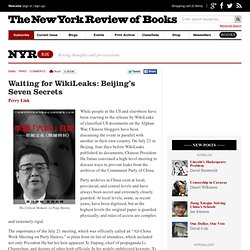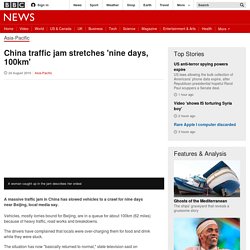

Waiting for WikiLeaks: Beijing’s Seven Secrets. While people in the US and elsewhere have been reacting to the release by WikiLeaks of classified US documents on the Afghan War, Chinese bloggers have been discussing the event in parallel with another in their own country.

On July 21 in Beijing, four days before WikiLeaks published its documents, Chinese President Hu Jintao convened a high-level meeting to discuss ways to prevent leaks from the archives of the Communist Party of China. Party archives in China exist at local, provincial, and central levels and have always been secret and extremely closely guarded. At local levels, some, in recent years, have been digitized, but at the highest levels the original paper is guarded physically, and rules of access are complex and extremely rigid.
We must resolutely oppose any mistaken tendency to distort or defame the Party’s history [and] must use only authorized Party history to educate Party members, officials, and the masses, especially the young. 1. 2. 3. 4. 5. 6. 7. Pinyin. Chicago on the Yangtze - By Christina Larson. View a photo essay about Chongqing Yan Qi spent most of her childhood living with her grandparents in a mountain village on the outskirts of what is now the world's fastest-growing city.

It was always raining, she remembers, and nothing much seemed to happen. With no bridges to cross the fast-flowing Yangtze River, the nearby town center -- today a 40-minute drive away -- took several hours to reach by long-distance bus. Today, Yan Qi works not far from where she grew up, at her company headquarters on a vast estate north of Chongqing. At 43, she is one of the richest women in the country, a restaurant tycoon whose Tao Ran Ju -- "Joyous Restaurants" -- chain now operates more than 90 eateries in 26 far-flung provinces, from low-end noodle shops to luxurious banquet halls. These are good times indeed for Chongqing, home to 32 million people and growing so quickly its maps are already out of date by the time they are printed. How did this happen? And convert it has, at astonishing speed. Shanghai prepares for Expo 2010. Construction workers and organizers in Shanghai, China are busily completing tasks ahead of the planned opening of the 2010 World Expo on May 1st - planned to be the largest World Expo in history.
The theme of the Expo is "Better City, Better Life", and is scheduled to run until October 31, 2010. In recent months, large construction and renovation projects have dominated much of Shanghai, in preparation for becoming the World's stage on May 1st. Up to 800,000 visitors are expected each day - a total of 70 million visitors in all visiting exhibitions from nearly 200 participants around the world. Collected here are several recent photos from Shanghai as construction nears completion for the Expo 2010. ( 31 photos total ) In this photo taken Sunday, Feb. 21, 2010, a man labors in front of the Seed Cathedral, formed by thousands of slender acrylic rods - the centerpiece of the UK Pavilion, at the Shanghai World Expo site in Shanghai, China.
China traffic jam stretches 'nine days, 100km' A massive traffic jam in China has slowed vehicles to a crawl for nine days near Beijing, local media say.

Vehicles, mostly lorries bound for Beijing, are in a queue for about 100km (62 miles) because of heavy traffic, road works and breakdowns. The drivers have complained that locals were over-charging them for food and drink while they were stuck. The situation has now "basically returned to normal," state television said on Monday. There has been a boom in road building in China in recent years but vehicle use has soared at the same time. The stalled traffic stretched between Jining in Inner Mongolia and Huai'an in Hebei province, north-west of Beijing, said the Global Times.
The road works which were obstructing traffic are necessary to repair damage caused by an increase in cargo lorries using the highway, the state-run newspaper said. They are not expected to be finished until mid-September.